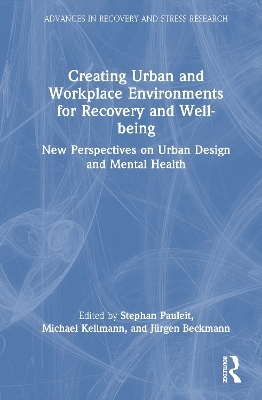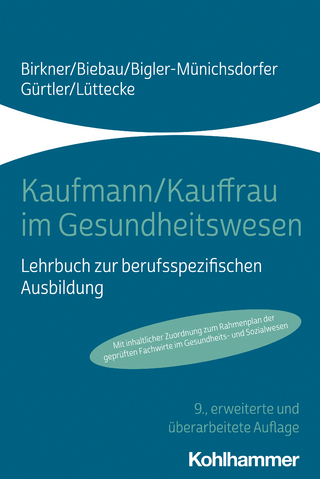
Creating Urban and Workplace Environments for Recovery and Well-being
Routledge (Verlag)
978-1-032-56427-2 (ISBN)
- Noch nicht erschienen (ca. Dezember 2024)
- Versandkostenfrei innerhalb Deutschlands
- Auch auf Rechnung
- Verfügbarkeit in der Filiale vor Ort prüfen
- Artikel merken
Connecting research from different scientific disciplines, the book provides a broader perspective of creating healthy lifestyle in society. It focuses on mental health and well-being by exploring how urban and workplace environments can be created to enhance and promote recovery. Divided into three parts, the book begins by investigating the multi-dimensional challenges of planning and design for stress reduction and recovery in urban areas. Part 2 concentrates on the design of residential and working environments, including commuting between the two, while Part 3 considers how neighbourhoods and entire cities contribute to or obstruct stress reduction, recovery, and well-being. The book concludes by demonstrating how the insights from the book can be implemented in practice to create restorative and inclusive environments. Bringing together leading experts, the book offers an interdisciplinary perspective for increasing well-being in urban developments.
The book will be of interest to researchers and practitioners in related fields, including environmental psychologists, urban planners, architects and landscape architects, healthcare staff, and policymakers.
Stephan Pauleit is Chair for Strategic Landscape Planning and Management at Technical University of Munich, Germany. Michael Kellmann is Professor of Sport Psychology at the Faculty of Sport Science at Ruhr University Bochum, Germany. He is also Honorary Professor in the School of Human Movement and Nutrition Sciences at The University of Queensland, Australia. Jürgen Beckmann is Professor of Sport Psychology, Emeritus of Excellence, at the School of Medicine and Health at Technical University of Munich, Germany. He is also Honorary Professor in the School of Human Movement and Nutrition Sciences at The University of Queensland, Australia.
Part I: Conceptualizing the Problem 1. Urban flourishing: Human recovery and urban resilience as hubs for the city of the future Stephan Pauleit, Jürgen Beckmann, and Michael Kellmann 2. Commuting to work by car: Is travel time leisure time? Achim Elfering and Fabrice Huber 3. Eight days a week: Long working hours, recovery, and breaks K. Wolfgang Kallus 4. Designing urban green spaces supporting health and recovery Anna Bengtsson, Anna Åshage, and Patrik Grahn Part II: Designing Home, Private and Working Environments for Recovery 5. Built recovery: New perspectives on designing office and hospital work environments Gemma Koppen, Mark N. Phillips, Claudia Iovița, and Tanja C. Vollmer 6. Natural spaces for stress recovery and mental well-being across the life course Matilda van den Bosch and Ingrid Jarvis 7. Urban densification, access to green space and well-being: Consequences of not owning private green space and crowded public green spaces Sjerp de Vries and Lauriane Suyin Chalmin-Pui 8. A tale of two restorations: Urban biodiversity underpins ecosystem restoration and promotes psychological restoration Monika Egerer and Melissa Marselle Part III: Urban Planning and Management for Recovery 9. Impacts of heat on human well-being: Creating restorative indoor and outdoor thermal environments in a changing climate Amelie Bauer, Hannah Lehmann, Teresa Zoelch, and Stephan Pauleit 10. Urban safety as a prerequisite for reduced stress and recovery opportunities in the city of tomorrow: Reflections beyond gender-neutral planning practices Vania Ceccato 11. Multi-scale urban design and recovery: Strategies, pathways, and implications Lanqing Gu and Martin Knöll 12. Creating urban and workplace environments for recovery and well-being: A concluding summary Jürgen Beckmann, Michael Kellmann, and Stephan Pauleit
| Erscheint lt. Verlag | 30.12.2024 |
|---|---|
| Reihe/Serie | Advances in Recovery and Stress Research |
| Zusatzinfo | 9 Tables, black and white; 19 Line drawings, black and white; 8 Halftones, black and white; 27 Illustrations, black and white |
| Verlagsort | London |
| Sprache | englisch |
| Maße | 156 x 234 mm |
| Themenwelt | Geisteswissenschaften ► Psychologie ► Allgemeine Psychologie |
| Geisteswissenschaften ► Psychologie ► Arbeits- und Organisationspsychologie | |
| Geisteswissenschaften ► Psychologie ► Sozialpsychologie | |
| Studium ► Querschnittsbereiche ► Prävention / Gesundheitsförderung | |
| Naturwissenschaften ► Geowissenschaften ► Geografie / Kartografie | |
| Technik ► Architektur | |
| ISBN-10 | 1-032-56427-X / 103256427X |
| ISBN-13 | 978-1-032-56427-2 / 9781032564272 |
| Zustand | Neuware |
| Haben Sie eine Frage zum Produkt? |
aus dem Bereich


